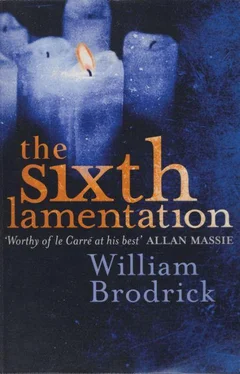William Brodrick - The Sixth Lamentation
Здесь есть возможность читать онлайн «William Brodrick - The Sixth Lamentation» весь текст электронной книги совершенно бесплатно (целиком полную версию без сокращений). В некоторых случаях можно слушать аудио, скачать через торрент в формате fb2 и присутствует краткое содержание. Жанр: Триллер, на английском языке. Описание произведения, (предисловие) а так же отзывы посетителей доступны на портале библиотеки ЛибКат.
- Название:The Sixth Lamentation
- Автор:
- Жанр:
- Год:неизвестен
- ISBN:нет данных
- Рейтинг книги:5 / 5. Голосов: 1
-
Избранное:Добавить в избранное
- Отзывы:
-
Ваша оценка:
- 100
- 1
- 2
- 3
- 4
- 5
The Sixth Lamentation: краткое содержание, описание и аннотация
Предлагаем к чтению аннотацию, описание, краткое содержание или предисловие (зависит от того, что написал сам автор книги «The Sixth Lamentation»). Если вы не нашли необходимую информацию о книге — напишите в комментариях, мы постараемся отыскать её.
The Sixth Lamentation — читать онлайн бесплатно полную книгу (весь текст) целиком
Ниже представлен текст книги, разбитый по страницам. Система сохранения места последней прочитанной страницы, позволяет с удобством читать онлайн бесплатно книгу «The Sixth Lamentation», без необходимости каждый раз заново искать на чём Вы остановились. Поставьте закладку, и сможете в любой момент перейти на страницу, на которой закончили чтение.
Интервал:
Закладка:
Chapter Thirty-Six
1
Lucy returned to court unable to forget the look of hope that had smoothed the anxious face of Eduard Schwermann. But now, sitting in the dock, he looked to the public gallery with growing agitation, directly towards the empty seat of Max Nightingale.
Mr Lachaise was uncharacteristically wearied, like the front-runner who unexpectedly limps to one side, unable to continue with the race. Another man, roughly the same age as Mr Lachaise, caught Lucy’s attention, being a new observer among what had become a familiar throng. He stood out not through that difference but through the imprint of tension. His short silvered hair, neatly cut and parted, suggested the boy as much as the man. She suspected that he was here with Victor Brionne, who was about to give evidence on behalf of the Prosecution.
When Counsel were all assembled, the judge came on to the bench in the absence of the jury
‘My Lord,’ said Mr Penshaw, rising to his feet, ‘the adjournment has been of considerable assistance. If I may briefly explain-’
‘Please do.’
‘An individual came forward from whom it was thought a contemporaneous account of events involving Mr Schwermann might be forthcoming. A statement was taken by the police which your Lordship has no doubt seen.
‘I have.’
‘There is nothing deposed therein which adds anything of significance to the Prosecution case. I do not propose to call the witness.’
The judge languidly raised an eyebrow ‘Has Mr Bartlett seen the statement?’
‘He has.’
‘Good.’
‘My Lord,’ said Mr Penshaw ‘That completes the evidence for the Crown.’
‘Mr Bartlett, are you ready to proceed?’
‘I am.’
‘Call the jury please,’ said Mr Justice Pollbrook, turning a fresh page in his notebook.
Desperate and confused, Lucy grasped for an understanding of what had happened. How could the Prosecution case come to an end without evidence from Victor Brionne? What had he said to the police that was of so little value? As she threw the questions like flints around her mind the jury returned to their seats, the Crown closed their case and all eyes locked on to Schwermann who, at any moment, would make his way from the dock to the witness stand. Mr Bartlett made a few ponderous notes with his pencil. He sipped water. A collective apprehension rapidly spread throughout the court. The judge patiently waited and then, just as he opened his mouth to speak, Mr Bartlett suddenly rose, saying:
‘My Lord, notwithstanding the usual practice of calling the Defendant first, in this particular case I call Victor Brionne.’
‘What?’ said Lucy, aghast.
Mr Lachaise leaned towards her and said in a low, strong voice, ‘Do not worry.’ With an affection tainted by anger she thought: it’s always the powerless who are most generous with their comfort.
Victor Brionne walked through the great doors. The appearance of the man who had haunted so many lives mocked expectation. He was wholly ordinary — shortish, with a wide, laboured gait; owlish eyes, his skin dark and deeply lined — the sort of man you’d meet in the market. He took the oath. His eyes avoided the dock, and he turned only once towards the handsome man three or four seats away from Mr Lachaise. Then he faced the jury.
Mr Bartlett constructed Brionne’s Evidence-in-Chief like a master stonemason. Both hands held each question and every expected answer was pressed slowly into position. He halted work frequently, allowing facts to settle.
‘Mr Brionne, you worked with Eduard Schwermann between 1941 and 1944?’
‘Yes.’
‘You are French by birth?’
‘Yes.’
‘You joined the Paris Prefecture of Police in June 1941, at the age of twenty-three?’
‘Yes, I did.’
‘You were, however, not an ordinary policeman, in the sense that you were based at the offices of the Gestapo.’
‘That’s right.’
‘I shall spare the jury an argument as to your status. Your place of work made you a collaborator?’
There was no reply Brionne’s lower jaw was gently shaking.
‘I asked if you were a collaborator. Please answer.
Very quietly, Brionne replied, ‘Yes.’
‘Louder, please.’
‘Yes. I was a collaborator.’ The words seemed to burn his mouth.
‘Please tell the ladies and gentlemen of the jury how you came to work with Mr Schwermann. ‘
‘I spoke good German. I was transferred to an SS department within weeks because they required a translator.’
‘And was that the extent of your “collaboration”?’ queried Mr Bartlett, slightly stressing the last word.
‘It was enough.’
‘Mr Brionne, I am now going to ask you some questions about an organisation known as The Round Table. We understand Mr Schwermann was credited with uncovering the smuggling operation. Did he ever tell you how he did it?’
‘Not exactly, no,’ Brionne wavered. ‘All he said was that a member of the group had told him everything.’
‘Did he say who this person was?’
‘No.’
‘Did you enquire?’
‘I didn’t, no.
Mr Bartlett’s voice was growing imperceptibly louder, imposing a sort of moral force on to his questions. ‘Having discovered, or perhaps I should say, having been presented with this information, what did Mr Schwermann do?’
‘He made a report to his superior officer.’
‘And the inevitable arrests followed?’
‘Yes, they did.’
‘Do you recollect the morning of the day the arrests took place?’
‘I do.’
‘Were you alone?’
‘No. I was with Mr Schwermann.’ ‘Please describe his demeanour.’
‘He was anxious, smoking cigarette after cigarette. ‘
Mr Bartlett contrived mild surprise. ‘Let us be absolutely clear. Is this the day The Round Table was shattered?’
‘It was.’
‘A day for which he would later receive the praise of Eichmann?’
‘Yes, that’s right.’
‘It should have been a time of excited apprehension for him, should it not?’
‘Yes, I suppose so.
‘Have you any idea, then, as to why he was so anxious?’
‘No.’
‘Let’s see if we can find an answer. You knew Jacques Fougeres?’ The barrister was speaking quietly now.
‘We were the best of friends. The best…’ He’d become a mourner in a dream.
‘Mr Brionne, did Jacques Fougeres have a child?’ Lucy sat forward.
‘Yes.’
‘A boy or a girl?’ ‘A little boy.’
‘Did you know the mother?’
‘Yes. Agues Aubret.’
‘By reference to the racial regulations implemented by the Nazis, to which ethnic group did she belong?’
‘She was Jewish.’
‘And the boy?’
‘The same. He was Jewish.’
‘Even though the father was a French Catholic?’
‘Yes.’
‘As far as Mr Schwermann’s superior officers were concerned, the boy, if found, would unquestionably have been deported?’
‘Yes, unless she had forged papers to conceal her Jewishness.’ ‘Where is Agnes Aubret now?’ asked Mr Bartlett quietly ‘She perished. Auschwitz.’
Brionne was unable to continue. His face shuddered repeatedly with such violence that the judge suggested he might like to sit down, but Mr Bartlett pressed on urgently:
‘And the boy, the boy; what happened to the boy?’
‘He was saved,’ mumbled Brionne, turning quickly to the dock. ‘Mr Schwermann took the child, before the arrests were carried out, and hid him with a good family.’
Mr Bartlett followed through quickly and quietly, prompting fluid, hushed replies.
‘How do you know this?’
‘I saw it with my own eyes.
‘How often did the opportunity to act in this way arise?’
Читать дальшеИнтервал:
Закладка:
Похожие книги на «The Sixth Lamentation»
Представляем Вашему вниманию похожие книги на «The Sixth Lamentation» списком для выбора. Мы отобрали схожую по названию и смыслу литературу в надежде предоставить читателям больше вариантов отыскать новые, интересные, ещё непрочитанные произведения.
Обсуждение, отзывы о книге «The Sixth Lamentation» и просто собственные мнения читателей. Оставьте ваши комментарии, напишите, что Вы думаете о произведении, его смысле или главных героях. Укажите что конкретно понравилось, а что нет, и почему Вы так считаете.












